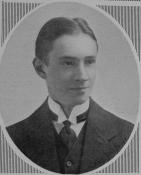
|
The King's School Canterbury |
Roll of Honour |
| 2nd Lieutenant John Hardy MUSSON | |
|
2nd Battalion Queen's (Royal West Surrey) Regiment Date of birth: 23rd August 1894 Date of death: 19th July 1915 Killed in action aged 20 Buried at St Vaast Post Military Cemetery, Richebourg-L'Avoue Plot I Row J Grave 8 |

|
| He was born at Balham in South West London on the 23rd of August 1894 the eldest son of Samuel Peter Musson, a singing teacher, and Naomi (nee Hardy) of Kinnaird House, Upper Norwood. He was christened at St Mary's Church, Balham on the 7th of April 1895. He was educated at Stanley House School, Cliftonville, Margate in Kent and at the King's School Canterbury from January 1910 to July1912. He was a member of the Officer Training Corps, played rugby for the 2nd XV and was a member of the school athletic team, winning his sports colours in 1912. He won 2nd place in the public schools fencing competition and rowed as bow in the Rowing IV of 1912 being awarded his rowing colours the same year. He went on the Lycee Faidherbe in Lille and Lille University (diploma 1914) following which he went to the London University. Following the outbreak of war he enlisted at 66 Victoria Street , London as Private 2361 in the 18th (Service) Battalion Royal Fusiliers (City of London Regiment), University and Public Schools Corps on the 15th of September 1914. At a medical examination, which was held on the same day, it was recorded that he was six feet tall and that he weighed 164lbs. It was also noted that he had a fair complexion, grey eyes and mousey hair. He was promoted to Corporal on the 3rd of October 1914. After attending the Royal Military College Sandhurst, he was commissioned as a 2nd Lieutenant in the 2nd Battalion the Queen's (Royal West Surrey) Regiment on the 17th of February 1915. He embarked for France on the 24th of May 1915 as a replacement following the appalling casualties the battalion had taken during the Second Battle of Ypres and arrived to join the 2nd Battalion of his regiment in the field on the 30th, along with three other officers. During the period from mid May to September 1915 the battalion were holding the trenches in various parts of the line around Bethune. During his time in France he wrote two letters which were reproduced in the Cantuarian:- "I've been out about a fortnight now and I'm quite enjoying it. We are three miles from the firing line but get shelled however. Two civilians in the village were killed yesterday I and another officer are billeted in a farmhouse; the peasants are kind., and I find my French very useful. We ride every day, but have to be careful not to ride into German ground... I met Fluke the other day; he was in the same troop train. We are in the same Brigade. One carries on here much the same as in England." "... I have been out here nearly three weeks. We have just had five rather desperate days in the front line of trenches. I was given command of a Company which was rather a responsibility, considering that it was my Company who were nearest the enemy 30 yards away, and we had to do all the work. I had to go out on the intervening ground patrolling. But I sent in useful reports and was thanked by my C.O., and a Colonel said he would mention me to the General. We were shelled incessantly, and lost some men. We are now in reserve for a day or two. This morning we had a service in an orchard; so peaceful after that strain. I never slept at all. The Padre said we had passed through something and we should never be the same! I seem the same however. The smell of dead was awful. While patrolling I often mistook a dead body for a German until I felt the poor devil!" The 2nd Battalion Queen's entered the trenches at Rue de Bois on the 18th of July 1915 and he was killed while reconnoitring in front of the German wire the following day. His father received the following telegram dated the 21st of July 1915: - "Deeply regret to inform you that 2nd Lieut. J.H. Musson 2nd Queens was killed in action July 19th. Lord Kitchener expresses his sympathy." He was mentioned in Field Marshall Sir John French's despatches of the 30th of November 1915. His Commanding Officer wrote:- "The battalion has lost a brave and valuable young officer" He is commemorated on a memorial outside All Saints Church, Beulah Hill in Upper Norwood and on the war memorial at the Royal Military College Sandhurst. A portrait he painted of the family's maid, Maria Herbert, was sold at auction to a private collector at Christie's, South Kensington on the 18th of January 2001. |
|
Back